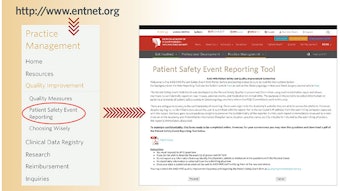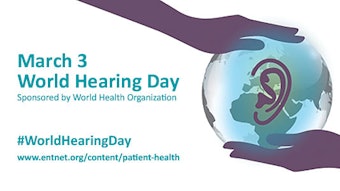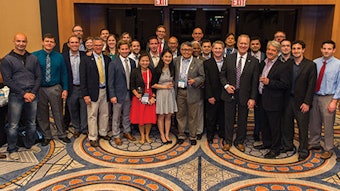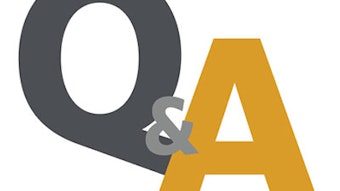AAO-HNS Humanitarian grantees: Two grantees in western Kenya
As a product of many years of Jesuit education, I (Katherine) have been encouraged to live the Jesuit motto of being “women and men for others” by sharing my time, talents, and resources to positively affect those around me, especially those less fortunate than I.
Katherine Nickley, MD, and Neela Rao, MD
As cliché as it sounds, we—like most doctors, we suspect—went into medicine to help people.
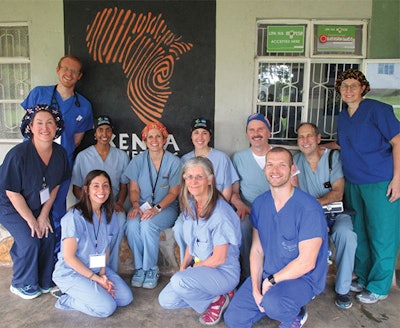 Katherine Nickley, MD, third seated on the bench, and Team 22 grin for the camera.
Katherine Nickley, MD, third seated on the bench, and Team 22 grin for the camera.As a product of many years of Jesuit education, I (Katherine) have been encouraged to live the Jesuit motto of being “women and men for others” by sharing my time, talents, and resources to positively affect those around me, especially those less fortunate than I. While medical school provided multiple medical service opportunities, residency and real-world pressures recently have limited my time and energy to continue with humanitarian work. The day-to-day grind, especially on long, trying days, can make it difficult to remember why I chose this path. This fall, thanks to the support from an AAO-HNS Humanitarian Travel Grant, I had the opportunity to remind myself when I traveled to western Kenya for a surgical mission trip.
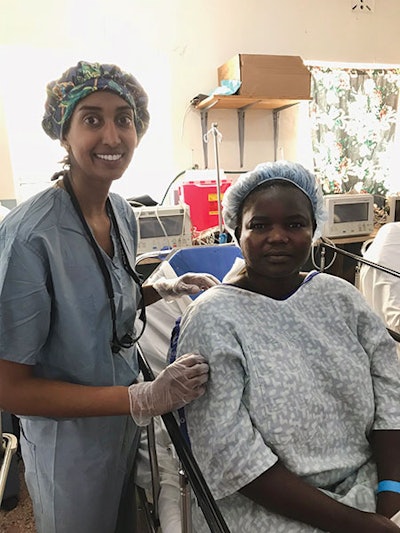 Neela Rao, MD, stands with a patient before surgery
Neela Rao, MD, stands with a patient before surgeryWith Katherine, I (Neela) had the privilege of being a member of Team 22, an otolaryngology surgical team, working at Kenya Relief’s Brase Clinic in Migori, Kenya. We started as a group of strangers from all areas of the country and from all different backgrounds, including both medical and non-medical. Despite our differences, we were bonded by our desire to serve the people of Migori and deliver healthcare to those whose daily access is severely limited. With this shared goal in mind, we quickly became an easy-going, yet efficient team.
We began our clinic on our second day in Migori, though some of our patients had already been waiting outside the clinic for much longer. While I thought the windy, dusty, eight-hour drive from Nairobi was arduous, I could not imagine making a similar, hours-long trek on foot as many patients had.
Within the first few hours, the surgical and anesthesia teams had screened and signed up 50 patients for surgery, while the medical teams treated dozens more patients. Our surgical patients ranged from children as young as three with chronic ear infections needing tympanostomy tubes to elderly women with impressively large thyroid goiters. After clinic, while we were able to return to our lodgings to rest for the busy three days to come, many of our patients and their families slept outside the clinic waiting for their surgery.
The next three surgical days were a blur. Several Kenyan scrub techs and nurses, who assisted in the operating rooms and pre-operative areas, joined the mission team. We were united by our shared desire to safely and efficiently deliver quality healthcare to our patients. Over the three days we performed nearly 50 surgeries, from large substernal hemithyroidectomies to adenoidectomies, on four operating room beds, without any major post-operative complications. The days were long and full of challenges, including power outages, limited supplies, and sweltering heat. But desire to help our patients drove us forward. Our successes were a testament to our teamwork and the determined and gracious spirit of our Kenyan patients. Yet, the days were not without some feelings of disappointment. There were many patients who traveled a great distance and waited for hours or days but were unable to receive treatment. There were several patients who were found to likely have thyroid carcinoma during their surgeries but were unable to afford the fee to send their specimen to the nearest hospital for pathology, and would be unable to afford further surgery or treatment at that hospital, which was three hours away. Despite this news, these patients still graciously thanked us with an “asante sana.” More so than our successes, these defeats reminded us of the importance of access to quality medical care.
